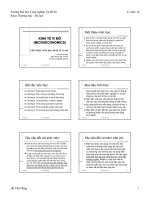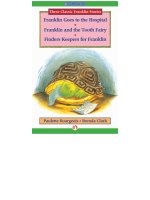Nancy yi fan mark zug SWORDBIRD 01 swordbird (v5 0)
Bạn đang xem bản rút gọn của tài liệu. Xem và tải ngay bản đầy đủ của tài liệu tại đây (1.53 MB, 132 trang )
SWORDBIRD
NANCY YIFAN
ILLUSTRATIONS BY
MARK ZUG
TO ALL WHO LOVE
PEACE AND FREEDOM
TABLE OF CONTENTS
MAP
PROLOGUE
Shadows
1.
The Red and the Blue
2.
Slavebirds’ Plan
3.
Squawk, Squawk, Squawk
4.
The Battle of the Appleby Hills
5.
The Woodbird in the Grass
6.
Aska’s Words
7.
The Flying Willowleaf Theater
8.
The Bright Moon Festival
9.
Danger
10.
Surprise Attack
11.
Ideas
12.
Remains of Victory
13.
Escape
14.
The Leasorn Gem
15.
Surmounting the White Cap Mountains
16.
A Ball of Fire
17.
Second Raid
18.
Living on Hope
19.
Miltin’s Wish
20.
Preparations
21.
Swordbird!
22.
Freeing the Slavebirds
23.
Excerpt from the Stone-Run Chronicles
EPILOGUE
A Pool of Liquid Gold
MAJOR CHARACTERS
ACKNOWLEDGMENTS
ABOUT THE AUTHOR
CREDITS
COPYRIGHT
ABOUT THE PUBLISHER
MAP
Darkness nourishes power.
—FROM THE BOOK OF HERESY
PROLOGUE
SHADOWS
Beams of light fell through the trees, creating shadows that flecked the thick, moist
undergrowth. Hidden in a patch of those shadows, a fortress was under construction. Many
woodbirds had been captured and pinioned for this, and they worked wordlessly, carrying
stones, clay, and sticks day after day. Usually a coal black crow could be found strutting
among them. Whenever possible, he would spring on an unsuspecting victim with curses,
yells, and a sound lashing. He was Bug-eye, the driver of the slavebirds, who carried a
black leather whip the color of his feathers.
Through one sly golden eye, a red-brown hawk in dark robes observed the construction
of his fortress. His name was Turnatt. Large for his kind, he towered over his captain and
soldiers. With sharp claws for battling, a loud, commanding voice, and foul breath, he was
a bird to be feared.
His nasty habit of tapping an eye patch over his left eye while glaring with his right
made the other birds shiver.
Turnatt had raided countless nests, camps, and homes, capturing woodbirds as slaves
and bringing them to this secret, gloomy corner. Now the time had finally come: the
building of Fortress Glooming. Sitting on a temporary throne, the hawk let thoughts of evil
pleasure pass through his mind. As Turnatt watched the thin, helpless slavebirds’ every
movement, he tore into a roasted fish so messily that juices ran down his beak.
Slime-beak, Turnatt’s captain, was hopping about, glancing at the trees bordering the
half-built fortress. He dreaded Turnatt, for he worried about being made into a scapegoat.
Displeased, Turnatt stared down his beak at his nervous captain, his bright eye burning
a hole into the bothersome crow’s face.
“Stop hopping, Slimey—you’re getting on my nerves. I’ll demote you if you keep on
doing that.” A fish scale hung from the edge of Turnatt’s beak.
Slime-beak shivered like a leaf, partly because of fear and partly because of the
hawk’s bad breath.
“Y-yes, milord. But it has been three days since Flea-screech and the soldiers went to
look for new slaves. They still haven’t returned!”
The hawk lord guffawed. The tail of the roasted fish fell from his beak and
disappeared down the collar of his robe.
“Fool, who has ever heard of little woodbirds killing a crow? If you don’t stop with
that nonsense, I’ll send you to get slaves! Now go and check the progress on my fortress.
Then come back and report your news!” Turnatt waved the long, embroidered sleeve of his
robe at the captain.
Slime-beak thought himself lucky that the hawk was in a good mood. Knowing Turnatt
was fickle, Slime-beak dashed away.
Seeing the crow scurry off, dizzy and awkward, Turnatt tapped his covered eye in
satisfaction. He chuckled, his glossy feathers shaking. His fierce yellow eye narrowed
wickedly, becoming a slit. He was Lord Turnatt—the Evil, the Conqueror, the Slayer, and
the Tyrant of soon-to-be Glooming. He thought about torturing woodbirds, killing others
that got in his way. Nobird—nobird—could stop the mighty Turnatt. It would be as he had
dreamed for seasons. He would rule the entire forest, with millions of slavebirds to bow
down before him. Turnatt tilted his head back and let out a bloodcurdling screech that
echoed throughout the forest. Slime-beak and the soldiers followed suit, their loud chants
drowning out every other sound.
“Long live Lord Turnatt, long live the Tyrant of Fortress Glooming, long live the lord!”
Over the shouts, the sun rose above the treetops.
A forest split in two cannot stand.
—FROM THE OLD SCRIPTURE
1
THE RED
AND THE BLUE
Just north of Stone-Run Forest, a war party of cardinals glided in and out of the shadows as the light
of dawn slowly slipped into the sky. They traveled swiftly and low, each grimly wielding a sword in
one claw. The leader, Flame-back, a sturdy cardinal distinguished by his larger and more powerful
wings, reviewed their plan of attack.
“Circle the camp, wait for my signal, attack. Simple. Everybird understand?” Crested heads
bobbed in answer.
The idea of violence frightened a young cardinal, who wrapped his claw tightly around his
sword hilt. “Flame-back, are the blue jays awake? If they are, we’ll die! I don’t want to die!”
Flame-back looked at the blurred land in the distance and, flapping his strong wings a couple of
times, tried to reassure his band.
“The blue jays don’t wake up so early, and nobird’s going to die. Nobird’s going to kill. Hear?
We just scare and attack. No hurting.” Pausing, Flame-back added in a more comforting tone, “And
we must find our eggs. We can’t let anybird, anybird at all, steal our unhatched offspring.” The speech
calmed his band, especially the youngster, whose wail dwindled to a sniff and a sob.
The cardinals were deep in thought. They all knew that Flame-back was right. There were no
sounds except their wings, whooshing and rustling against the wind as they flew—red figures against
a blue sky. They soared over the Appleby Hills and across the Silver Creek. Dewdrops trembled on
delicate blades of grass; dandelions and daisies peeped over their leaves to greet the sun. Near the
fringe of the forest, beech trees stood still, and only the morning breeze occasionally disturbed them.
Those trees were ancient ones, covered with moss and vines, leaning over to touch branches with one
another. Small creeks gurgled gently as they rippled along, under mists that covered the ground. But
the cardinals were in no mood to enjoy such things. They were on a mission. The war party made a
sharp turn along a boulder and flew over the Line, the border between the territories of the blue jays
and the cardinals.
As they crossed, a twinge of uneasiness ran along every cardinal’s spine. They were entering
forbidden territory. But about a month before, it hadn’t been. A month before, the cardinals and blue
jays had been good friends. Their hatchlings had played with one another; they had fished for shrimp
and hunted for crickets together. But things were different now. With a brisk flap of his wings Flameback led his cardinals through a twist in a gap in the tangled trees.
“Lively now, lads. You all know what we’re here for, so get ready. Fleet-tail, branch off with a
third of our forces and go around to the left. You, take another third and go to the right. The rest,
follow me. Swift and silent, good and low, friends.”
In a flash the cardinals separated into three groups and departed into the shadows. After flying
through a ghostly fog, the cardinals saw their destination. Eyes glistened and heartbeats quickened.
With a few hushed words, the cardinals swiftly got into positions surrounding the blue jay camp. No
feathers rustled. They sat as silent and rigid as statues, waiting for Flame-back’s signal to attack.
The cardinals’ target was ten budding oak trees hidden behind a tall, thick wall of pines. The
oaks grew in a small meadow of early spring flowers and clover sparkling with dew. The pine tree
border was so dense that one might fly right past it and not see the oak trees inside. It was indeed
cleverly hidden. Those oaks were the home of the Bluewingle tribe.
It was very quiet. Occasionally a swish of feathers and breathing broke the silence. A strange longlimbed tree protruded from the center of the grove. In the branches of this tree a hushed exchange was
taking place.
An elderly blue jay, Glenagh, shifted on his perch, his thin gray shoulders hunched up. Peering
through the oak leaves, he could see a dim ray of light climbing up the ancient mountains.
How long can we go on fighting our old friends? the old blue jay wondered.
He turned abruptly to face his companion, Skylion. “How are you going to keep this ‘war’ up?”
Glenagh asked. “Ever since you became the leader of the Bluewingles, we’ve been fighting the
cardinals constantly.” The old blue jay sighed. His feathers drooped. “You definitely do make your
mind up faster than a falling acorn hits the ground.”
Skylion turned his gaze toward the elder, Glenagh. “They used to be our friends—our family,
almost,” he said. The younger blue jay poured a cup of acorn tea for the elder with disbelief.
Shaking his graying head sadly, Glenagh accepted the tea with a worn claw. He gazed at his
reflection in his cup with a dreary look. “Remember Fleet-tail? The cardinal who’s always so quiet?
Just last week I saw him with a raiding party, hollering and yelling like the rest.”
“Well,” Skylion replied hoarsely, “we have to regard the cardinals as enemies. Stealing and
robbing—that’s what they do now.”
Leaves rustled as the wind changed direction.
“True, the cardinals have robbed us bare to our feathers, but we have done our share as well.”
Glenagh glanced again at the light outside. “The sack of pine seeds, the raisins, the bundles of roots,
the apples…We’ve taken back more than what was stolen from us. We cannot say we aren’t thieves.”
Skylion hastily dismissed the idea. “Yes, but they stole our blueberries, our walnuts and honey!
They stole the raspberries, the mushrooms, and more!” the blue jay leader argued. “We only took
back food because we needed to survive. It’s just spring. There’s hardly any food you can gather
outside. And what about our eggs? Our offspring. The next generation. Is there an explanation for
that?”
“Peace is more important, Skylion.” Glenagh shook his head and took a sip of acorn tea. “You
do have a point about our eggs, but the cardinals declared that we stole their eggs and they didn’t
steal ours. I cannot believe that having been friends for so long, we have suddenly become enemies.
Maybe they didn’t steal from us; maybe somebird else did. We should go and talk with them about
this.”
“No, Glenagh. It would be a waste of time! We tried to talk before, but they only accused us of
stealing from them first. You know that isn’t true!” Skylion snorted.
“But Skylion, don’t you—”
Skylion leaned forward. “Glenagh, can you stay calm and aloof when our eggs are snatched and
stolen right from under our beaks? Of course not. We are fighting to get them back!”
Glenagh calmly looked at the leader, the steam of the tea brushing his face. He was silent for a
few moments and then said, quite slowly, “Does fighting solve the problem?”
Skylion sighed deeply and shifted his glance to the wall, where there hung a painting of a white
bird holding a sword. Though the painting was worn and the color faded, the picture still was as
magnificent as ever. The bird seemed to smile at Skylion. Skylion almost imagined that the bird
mouthed something to him.
Skylion whispered, “I wish Swordbird could come here to solve this.”
“Ah, Swordbird…” Glenagh toyed with the name as a smile slowly lit up his face. “The
mystical white bird, the son of the Great Spirit…He is a myth, but I know he exists. I know in my
bones. Do you remember the story in the Old Scripture about a tribe of birds attacked by a python?
They took out their Leasorn gem and performed a ritual to summon Swordbird. Immediately he came
in a halo of light, and with a single flap of his great wings the python vanished into thin air.” Glenagh
paused. “Well,” he said, “to call for Swordbird, we need a Leasorn gem. It’s said to be a crystallized
tear of the Great Spirit. But we don’t have one. We have no idea where to find one either. So, it’s
what’s in you and me that counts.” Glenagh drained his cup, savoring the last drops.
Skylion opened his beak to reply, but he was interrupted by a frantic rustle of leaves. A young
blue jay’s head poked through, and in a high, nervous voice the youngster gave the message: “The
cardinals! We are being attacked! We are being attacked!”
Birds are born to have wings;
wings are symbols of freedom.
—FROM THE OLD SCRIPTURE
2
SLAVEBIRDS’
PLAN
Turnatt’s horde had flown from the warm southwestern region to Stone-Run with about forty
slavebirds. Because crossing the White Cap Mountains was trying and treacherous and food shortages
occurred on the way, only thirty-eight slavebirds survived the trip.
A month before, the slaves had lived free among their own tribesbirds. Now they dwelled in the
leaky, half-rotten slave compound, with their legs chained to a stone wall. The building’s walls were
wooden bars that gave off awful splinters, and it seemed as if they would collapse at any moment.
Above, rotting hay and logs were bound together for a roof, with holes here and there to see the sky;
below was the bare ground, always uncomfortably moist. As the mild spring brought showers and
damp winds, the slaves were allowed to build a fire in the slave compound. The birds wore nothing
but rags on top of their mud-caked feathers, and as they huddled around the fire, they shivered.
Tilosses, an aged sparrow who had not lost his sense of humor, started the discussion.
“It has been several weeks since we were caught and brought to this filthy place. Ladies and
gentlebirds, we have no other choice: If we wish to see our homes and families again, we must
escape!” Tilosses paused to make his speech more dramatic. “Escape may not come easily like a
grand supper delivered to us; nevertheless, we can find a way if we work at it. That Turnatt may be
dangerous, but sometimes he is as careless as a fly. Pah! Why, his name sounds like Turnip!” Hearty
laughter followed. “We all know that we need to escape somehow, not remain here to rot. The
question is, how?”
Across the campfire a burly flycatcher called Glipper spoke up. “If just one of us escapes, we
might have a better chance. The native woodbirds in this forest would help us if we can send a
message to them.” There were murmurs of agreement.
“Well,” a nuthatch said, “the woodbirds would help us, but how can we reach them? The guards
are too numerous, and that slave driver, Bug-eye, seems to be everywhere at once. It’s really unsafe.
How could anybird slip out of the fortress to contact the woodbirds?”
A jaunty goldfinch blurted, “I know how! Trick the captain. Make him think you’re helping him.
Convince him to let you gather firewood every day outside the fortress. He’ll trust you after a few
days. Then find a woodbird to help!”
“Good idea!” said Tilosses.
Glipper shook his head. “Chances are, nobird would be allowed outside alone,” he declared.
“There’s little possibility of success, with all the risks and hazards.”
“But there still is a possibility, however small, so we should try it,” somebird in the crowd
murmured.
Tilosses spoke. “Who will take the risk?”
“A bird who is wise, persuasive, and innocent. These are the right qualities,” chimed the
goldfinch, cocking her head to one side.
The silence stretched for a long time. A twig crackled in the fire. Who will do it? Who? Who?
The question hung in the air.
“I will!” The voice of a young robin piped up from the crowd of slavebirds. Heads turned to see
the speaker.
Though all the slavebirds knew the robin’s name, they had no more knowledge of him beyond
that. He was quiet, rarely speaking to anybird.
At first glance he seemed rather weak for his kind, yet when the slavebirds took a close look at
him, they noticed that his agile legs and lean frame looked strong, able to endure. He had a speck of
red among his black neck feathers. Despite his bedraggled, thin, and dirty appearance, there was
something in his big, shining eyes that warmed the onlookers’ hearts.
“Miltin?”
The robin nodded, and the corners of his beak twitched into a smile. He looked so confident that
everyone knew he should be the chosen one.
Glipper peered at the robin and grinned. “Miltin, I have a feeling that you are going to have quite
some adventure.”
Outside, the wind whistled.
The supreme pleasure a tyrant
can gain is to torture others.
—FROM THE BOOK OF HERESY
3
SQUAWK,
SQUAWK, SQUAWK
Turnatt perched side by side with his captain, Slime-beak, drinking chestnut beer and wine and
talking in a newly built room of Fortress Glooming. Magnificent blades and ancient weapons
glistened on the walls, soft cushions adorned chairs of red cedar, and silken curtains draped the
windows.
The hawk lord glared at his captain over the rim of his silver goblet. “You’d better finish the
construction of my fortress in eight weeks,” he threatened, “or I’ll pull your feathers off to make me a
duster!”
Slime-beak cringed. “I-I’m afraid finishing is almost impossible, milord.”
“What?” The flames of anger that blasted from Turnatt’s eye seemed hot enough to burn Slimebeak to a crisp. “You remember, when we first came here, you and I sat down and talked? Right there
and then, with your beak flapping like an old shoe, you said it would be finished in early spring. Well
now! It is close to summer, and you’re still nagging me about needing more time. What in the world of
crazy captains is your reason?”
“Well…w-we’re short of wings now, mi-milord. Many of the slavebirds h-have been sick.”
Slime-beak’s voice crackled in fright as he spoke.
Because Turnatt knew that was the truth, his anger subsided a bit. He still growled slightly as he
talked. “Flea-screech will bring back more slaves soon. There are cardinals and blue jays nearby.
They’ll make good workers. Kill the sick slavebirds as soon as we have new ones,” he commanded,
setting down his goblet. The silver reflected the rising sun and became blood red. “And tell the scout,
Shadow, to come here.”
“Yes, milord, yes, milord.” Slime-beak made his exit with springy, clumsy hops. The crow
captain’s wings were tilted awkwardly as he walked, and the pungent smell of alcohol surrounded
him like a thick mist.
As soon as Slime-beak’s clawsteps faded, Shadow glided in. He was a striking raven with
amber eyes instead of black. Turnatt mentioned the blue jays and cardinals to him.
“Some cardinals and blue jays, you said, Your Majesty?” Shadow bowed his head respectfully
and closed an amber eye. He seemed to melt in a puddle of darkness as he twirled the edge of his
black cloak fancifully with a thin, bony claw. “Aye, sire, they’re north of us, not too far by the wing.
We stole some food from their pitiful camps. Now each of them believes the others are thieves.” The
scout reopened his eye and peered at the hawk. Turnatt growled his approval. Shadow beamed as he
was offered a mug of beer, and he accepted it with ten times more flair than Slime-beak had. Sipping
silently, he answered with words Turnatt would like to hear. “I will check on them again today and
bring back some white grapes to make fine wine for you, Your Majesty. You are too noble for such a
drink as beer, Your Majesty.”
“Yes, yes,” Turnatt urged. The effect of the liquor was starting to make the hawk lord drowsy.
“Create even more disturbance and confusion for the cardinals and the blue jays. The more the better!
Then they’ll be weaker when we attack!” The hawk’s eyes misted slightly. “Now go, Shadow.”
The raven scout dipped his tail in salute and left, his amber eyes shining with eagerness. He
uttered a flattering remark as he left: “You are the mighty conquerer, Your Majesty. Farewell.”
As soon as the scout faded into the shadows of the hallway, Turnatt pictured a score of cardinals
and blue jays in his power. Yes, he would whip some of them himself. Maybe he would pull feathers
off a blue jay to make a fan and torture a cardinal with fire, watching his feathers get scorched…. All
the birds, his own! His own! Squawk, squawk, squawk. That’s what the birds would cry for mercy.
Turnatt laughed out loud. “Squawk, squawk, squawk…” he mused, speaking to himself. “Yes,
they deserve that.” From a shelf nearby he took out a tome entitled the Book of Heresy and started to
stroke the cover lovingly.
Outside the door Tilosses was eavesdropping, still wearing the apron as assistant to Turnatt’s
cook. He had pressed a teacup to the door and drawn his ear close to it. “Oh, yes,” Tilosses said with
a soft chuckle. “That’s what Turnatt will say after he finds out that the slavebirds have escaped.
Squawk, squawk, squawk.”
What does fighting bring us?
Fear, hatred, misery, and death.
—FROM THE OLD SCRIPTURE
4
THE BATTLE
OF THE
APPLEBY HILLS
Without a word Skylion dashed out of Glenagh’s study to organize his troops. Already the yells of
the cardinals were very close.
“Seven to guard the food store, ten to protect the eggs and the weak birds! The rest of you, quick,
form three rows, and go outside with backs to the trees! Hurry!” he hollered. The quiet halls were
suddenly alive with action and noise. The blue jays took off from different perches and flew in quick
formation to their assigned posts.
Skylion drew his sword and burst from the shadows of the leaves out into the daylight. “Attack!
Bluewingles forever!”
They were greeted by the flashes of the cardinals’ swords and loud yells.
“Power of the sun! Sunrise, charge!”
The silent morning was instantly filled with clangs of metal. The cardinals circled warily,
looking for the blue jays’ weak positions. The blue jays were cautious too, and whenever they sensed
that the cardinals were aiming at a particular place, they sent more birds to fight there.
At first the blue jays’ defenses seemed to be holding. But then a lean cardinal managed to slip
through into the food store and back out again, unnoticed by others. He had a bag in his claw. Stolen
food! Skylion spotted him. With a roar he charged upon the cardinal, and the cardinal waved his
sword in response. They parried each other’s moves, their figures almost lost in the whirl of silver
that was their blades. Finally, Skylion sliced the rope around the neck of the bag, and the sack
dropped into the grass below. Relieved of his heavy burden so suddenly, the cardinal lost his
balance. For a moment his defenses were down and his neck was exposed.
Instinctively, Skylion raised his sword. Yet something in him stirred…. The noises around him
faded away into silence. Peace is more important, Skylion. Glenagh’s voice haunted him, and he
could almost see the elder shaking his head disapprovingly. The blue jay leader felt weak and unsure.
He couldn’t—just couldn’t—bring down his sword upon the young cardinal. The cardinal closed his
eyes and tensed his neck, waiting for the blue jay’s blow….
The noises of the battle returned. Skylion quickly shifted the angle of his blow so that the flat of
the blade thumped on the cardinal’s shoulder.
The cardinal opened his eyes and locked them for a second with Skylion’s. There was surprise
in his eyes, and perhaps some gratitude. Then he was gone, disappearing behind the other battling
birds.
The blue jays held out stubbornly. Fighters from both sides were getting tired. The blue jays
were light and agile in build, while the cardinals were muscular and heavy-framed. Slowly, very
slowly, the blue jays drove the cardinals back toward the Line.
There the cardinals decided to hold their ground and retreat no more. The battle would be
decided on the tallest mound of the Appleby Hills. One minute the blue jays seemed to be winning,
but the cardinals gained advantage in the next. The red mingled with the blue, fighting, beating, and
yelling at one another.
Shadow, Turnatt’s scout, hid in a tall tree nearby, smiling cruelly at the fighting cardinals and blue
jays. “It’s better than I thought!” he crackled. “Wait until His Majesty hears about this!”
Aska had left the Bluewingle camp quietly that morning, before the attack by the cardinals. She was a
pretty blue jay, with glossy feathers, a sweet voice, a graceful figure, and eyes that were like deep
pools of dark chocolate. She sighed. The whole thing was too confusing for her to understand and to
accept. The fights and battles. How did the cardinals ever become our enemies? We were good
friends a month ago. Why not now? She missed seeing her best cardinal friends. She missed playing
on the Appleby Hills, where the sun shone brightly and dandelions carpeted the ground, making the
hills golden as far as the eye could see. It was now cardinal territory, and the blue jays stayed away.
She missed the taste of the cardinals’ special raspberry pies with golden, honey-covered crusts and
sweet, sticky fillings.
The more Aska thought, the dizzier she became. Sitting alone on a quiet branch did not help. She
looked around. A small creek gurgled peacefully nearby, and the fragrance of the early spring flowers
drifted to her nostrils. The scene would normally make Aska happy, but not now.
The blue jay, catching an uplift, rose unsteadily into the air. Thoughts whirled in her head as she
flew in the direction she thought was toward home. She shut her eyes for a second to clear her
thoughts. When she opened them, she found herself staring at shadows that floated in the air. The
shadows moved toward her.
Flea-screech grumbled unhappily. He hadn’t eaten a proper meal for four days. He and five soldiers
had been sent out to capture woodbirds, but they had found nothing. He knew he would be punished if
he came back with nothing more than half-starved soldiers.
Living on thin acorn soup and dandelion roots was not the kind of life Flea-screech wanted. In
despair he kicked the mossy ground. By chance a wad of moss hit another crow on his beak, muffling
his surprised gurgle. Flea-screech stared angrily at the soldier, and the soldier stared back, each
thinking of his own misery.
Flea-screech’s thoughts were interrupted by an excited whisper: “Sir, there’s a blue jay flying
not far from here who could be easily surrounded and captured!”
Seconds later, the crows flew off toward the flying blue speck. It wouldn’t know what the
shadows were until it was too late.
“Help!” Aska screamed as she realized what was happening. Darting this way and that, she flew
in complex patterns and then sped away, careless of her direction. The crows tried to surround her.
She knew that they were bigger and heavier than she was, so she flew her fastest through thick,
mazelike groves and bushes. The crashes and yells of pain told her that her plan was working. But the
crows kept following.
Fueled by her fright, she flew even faster. There were at least three birds behind her, or possibly
even five. Aska shuddered at the thought. The dense bushes wouldn’t last forever, she knew. They
ended only ten feet away. As she burst out into open air, another crow tried to block her path. She
yelped in surprise and, seeing no other way to avoid a collision, zoomed under the bird. The
dumbfounded crow shrieked with rage.
“Oh, you sly blue jay!” Aska heard the crow cry. “Soldiers!” he yelled over the loud whooshing
of their wings. “Chase that blue jay south toward Fortress Glooming! We’ll have it cornered!”
Aska flew through strange and murky territories, neither blue jays’ nor cardinals’. She peered
about for good places to hide. Her wings were getting sore from the flight. Oh, somebird help me! she
thought, taking no notice of the rain that bounced off her shoulders and dampened her feathers.
“You tricky blue jay! I’ll get you, me and my crew will!” The voices pursuing Aska were getting
louder as the crows drew closer. After ducking under a bush and hearing the crows crash into it, Aska
saw a startling scene, a half-built fortress towering over a great stretch of young birches and cedars,









